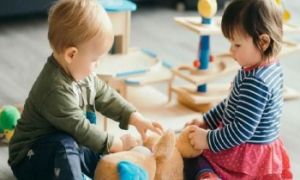

There is often a debate on whether colouring pages should be used in early childhood services. Do they limit creativity? Or foster creativity? Do they restrict children from thinking freely? Or can it they be used as inspiration? The following article provides information on the Pro and Cons Of Colouring Pages, Does Colouring Pages Hinder Creativity, Using Colouring Pages To Complement Open Ended Activities, Colouring Pages and the EYLF and more.
Street Libraries are small houses for books, installed outside your early learning service, accessible to the community, where people within the community can simply reach in and borrow a book that interests them; when they are done, they can return them back to the Street Library or pass them on to friends. The following article provides information on How Does A Street Library Work, Setting Up A Street Library, Getting Children Involved and more.
Positive phrases play a crucial role in children's growth because they help nurture their emotional, social, and cognitive development. The following article lists 30 positive phrases that educators should say to children.
MYTH: You have to attend work meetings after hours for free. FACT: You should be paid. MYTH: You need to pay for training. FACT: You are paid for those hours. Your employer must pay you for all hours you work and any compulsory time spent for work, including meetings and training.
Nature programs in early childhood settings are a fantastic way to connect children with the natural world and promote holistic development. The following article provides information on Key Aspects Of Nature Programs, Benefits of Nature Programs, How To Start A Nature Program, Nature Programs and The EYLF, Nature Activity Ideas and more.
Connecting with local Aboriginal and Torres Strait Islander (ATSI) communities can be a rewarding and enriching experience. The following article provides information on Steps To Seek Support and Build Relationships With ATSI Communities, Ensuring Involvement Is Respectful To ATSI Communities, How To Seek Permission To Use Or Share ATSI Stories Or Materials, Seeking Permission In NSW, Getting Involved With Local ATSI Organisations and more.
Embedding Aboriginal and Torres Strait Islander (ATSI) perspectives and pedagogies in Early Years education environments is essential for several reasons. The following article provides infromation on the Importance Of Embedding ATSI Perspectives And Pedagogies In The Early Years Education Environments, Incorporating ATSI Perspectives Into Your Practice, Incorporating ATSI Histories and Cultures in EYLF Curriculum, Examples Of Effective Activities, EYLF and ATSI Perspectives and more.
The Australian 24-Hour Movement Guidelines for the Early Years provide comprehensive recommendations for physical activity, sedentary behavior, and sleep for children from birth to 5 years. The following article provides information About The Australian 24-Hour Movement Guidelines for the Early Years, Key Recommendations, and more.
Children's drawing isn't just a pastime—it plays a crucial role in their development and learning. The following article provides information on Why Drawing Is Essential For Children, Activities That Can Promote Drawing Skills In Children, Age-appropriate Drawing Activities For Toddlers, How Drawing Helps Children Express Their Emotions, Activities That Can Help Children Express Emotions Through Drawing and more.
 Toddlers have a greater understanding of the world around them by this stage. Their cognitive development (also known as intellectual development and thinking skills) continues… Read More
Toddlers have a greater understanding of the world around them by this stage. Their cognitive development (also known as intellectual development and thinking skills) continues… Read More
 Infants begin to develop trust when parents begin to fulfil their needs. Such as changing an infant's nappy when needed, feeding on request and holding… Read More
Infants begin to develop trust when parents begin to fulfil their needs. Such as changing an infant's nappy when needed, feeding on request and holding… Read More
 Beginning at birth the construction of thought processes, such as memory, problem solving, exploration of objects etc, is an important part of an infant’s cognitive… Read More
Beginning at birth the construction of thought processes, such as memory, problem solving, exploration of objects etc, is an important part of an infant’s cognitive… Read More
 Toddlers want to do more on their own and do not like it when you begin to establish limits on their behaviour. Tantrums can become… Read More
Toddlers want to do more on their own and do not like it when you begin to establish limits on their behaviour. Tantrums can become… Read More
 Your preschooler is now able to focus their attention more accurately and is less influenced by distractions. The intensity of questions increase as your child… Read More
Your preschooler is now able to focus their attention more accurately and is less influenced by distractions. The intensity of questions increase as your child… Read More
 John Dewey is often seen as the proponent of learning by doing – rather than learning by passively receiving. He believed that each child was active,… Read More
John Dewey is often seen as the proponent of learning by doing – rather than learning by passively receiving. He believed that each child was active,… Read More
 Toddler advance and gains new skills in Gross Motor Development milestones achieved throughout earlier years. Co-ordination and challenges that could not be performed before such… Read More
Toddler advance and gains new skills in Gross Motor Development milestones achieved throughout earlier years. Co-ordination and challenges that could not be performed before such… Read More
 Erik Erikson developed a psychosocial theory to understand how we each develop our identities through eight stages of psychosocial development from infancy to adulthood. The… Read More
Erik Erikson developed a psychosocial theory to understand how we each develop our identities through eight stages of psychosocial development from infancy to adulthood. The… Read More
 At this point preschoolers begin to interact effectively with others. Play becomes more innovative and organized and “boyfriend” or “girlfriend” begins to emerge. Preschoolers have… Read More
At this point preschoolers begin to interact effectively with others. Play becomes more innovative and organized and “boyfriend” or “girlfriend” begins to emerge. Preschoolers have… Read More
 From now, babies begin to identify and respond to their own feelings, understanding other's feelings & needs and interact positively with others. A baby's social and… Read More
From now, babies begin to identify and respond to their own feelings, understanding other's feelings & needs and interact positively with others. A baby's social and… Read More

Having a solid grasp of developmental stages will help you evaluate children's play and learning...
See more...
Here’s a breakdown of developmental milestones for children aged 2 to 3 years, along with...
See more...
A: These are important situations where early intervention and appropriate strategies can make a significant...
See more...© 2009-2025 Aussie Childcare Network Pty Ltd. All Rights Reserved.
